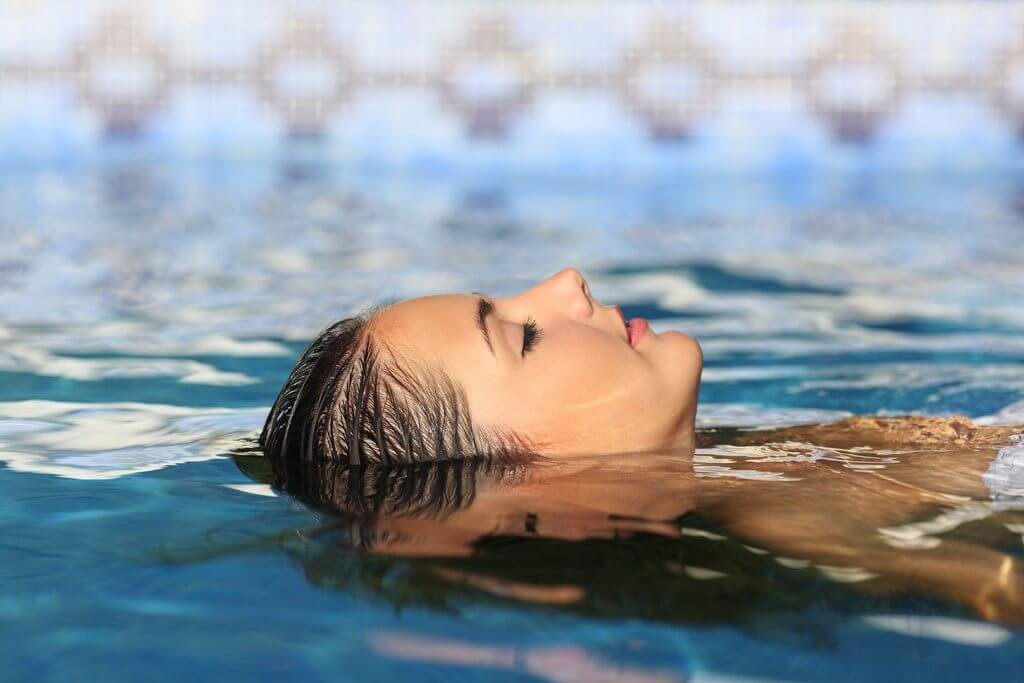Swimming is almost on everyone’s mind, especially during summer, isn’t it? You need to protect your skin as much as you are having fun, failure to which your entire skin will be damaged. We are exposed to sun when swimming. The UV rays from the sun affect your skin by causing dry skin, wrinkles, premature aging and black spots, among others. During swimming, you are also exposed to chlorine. Chlorine helps kill bacteria and can also damage your proactive oils in the skin. As a result, it causes acne, itching and rushes. Here, you will get tips on how to efficiently take care of your skin while swimming:
{ 1 } The Use of Sunscreen Oil

Generally, there are two types of sunscreen oil you can use to protect your skin. The first type of sunscreen oil acts a barrier for UV light. It either reflects or blocks UV light away from your skin. Mostly, this type of sunscreen oil looks like cream. The other type of sunscreen oil absorbs UV radiation. Consider the sunscreen oil that absorbs UV radiation when swimming. Generally, these oils protect your skin from damage. Apply another layer of sunscreen after sometime as it might be washed away while swimming. Give yourself a few minutes before swimming after applying your sunscreen oil. Sunscreen oil takes time to start protecting you from the dangerous UV light. Please apply sunscreen oil throughout your entire body as no part is spared by UV light.
{ 2 } Swim with Intervals

Some people have a habit of swimming for hours, without taking breaks. You might be having fun, but this habit poses numerous risks on your skin. First, your sunscreen oil or any lotion wears off as time progresses. This exposes your skin to numerous risks such as the UV light and Chlorine. Therefore, develop a habit of taking breaks while swimming. It can be in forty five minutes intervals or an hour interval. During breaks, have a habit of wearing a hat or sunglasses. Sunglasses and hat protects your skin from direct sunlight. Alternatively, develop a habit of relaxing in a shade.
{ 3 } Hydrate your Skin While Swimming

Do you know your skin can get dehydrated while swimming in an open pool? Our skin should be hydrated throughout to bring out an amazing look. Therefore, regularly sip some water at intervals to keep your skin hydrated. It is important that you don’t get dehydrated while swimming, failure to which the skin will absorb pool water. Hydrated skin can endure sunlight for a long period when compared to the dehydrated one. Regular partake of water also enhances your skin and gives it a glamorous look.
{ 4 } Apply a Barrier Cream with Cream

As earlier stated, chlorine can greatly damage your skin. It is used in swimming pools to prevent and disinfect spread of bacteria causing different kinds of diseases. Dermatologists constantly educate people about the nature of chlorine such as causing irritation to some people, giving some people red and itching skin. Some people might not encounter the above conditions, whereas others will not.
Be on safe side by using a barrier cream to protect your skin from damage. There are different kinds of products you can use in the market to protect your skin from chlorine. This ranges from petroleum, oils and glycerin. Try and focus your attention on products with dimethicone as it has been effective for a long period.
{ 5 } The Use of a Clean Swimwear

People have different types of skin. Some people’s skin is sensitive when compared to that of others. Numerous people don’t know that the swimwear we use for swimming influences its health. Some people don’t wash their swimwear after swimming. This can affect the general health of your skin, causing rashes, itchiness and redness. Consequently, chlorine can ruin your beautiful costume. Properly wash your swimwear to remove all the chlorine. Feel free to add some vinegar or disinfectant on your water before washing your swimming costume.
Don’t let your costume stay with chlorine for a long time after swimming. You should also avoid sharing swimming costumes as some people have skin disease.
{ 6 } Consumption of Herbal Tea

Are you a regular swimmer? If yes, you should take care of your skin or it might turn dark and develop some complications. Herbal tea is known to contain numerous health benefits. Herbal tea contains numerous antioxidants that protects your skin from any damage and regulates free radicals. Free radicals can greatly damage your skin and can be worse if your skin gets into contact with chlorine or UV rays.
Herbal tea also contains nutrients, needed for a healthy skin. There are different herbal tea brands to choose from. Choose herbal tea that has proven effective over the years.
{ 7 } Shower Immediately After Swimming

Some people have a habit of going home immediately after swimming. All pools rules encourage people to shower before and after swimming. This rule actually focuses on helping your skin. Chlorine clamps on our skin after swimming. Chlorine shouldn’t stay in the body for a long period or you risk additional dryness and other skin conditions. Warm water is recommended after swimming. You can also use shampoo to wash away any chlorine on your scalp. Use a moisturizer or drink plenty of water to hydrate your skin.
{ 8 } Don’t Sunbath Immediately After Swimming

Numerous people have a habit of sunbathing immediately after swimming. There are specific things worth noting down as far as sunbathing is concerned. First, you should only sundry yourself after washing off chlorine off your body. In addition to these, apply sunscreen oil on your skin before sunbathing. Ensure you use clean water to wash off chlorine.
{ 9 } Use Talc to Dry Off Some Regions

Numerous people don’t pay keen attention on areas around their armpits. As a result, both chlorine and UV rays can harm the skin around your armpits. Use talc to efficiently protect the skin around your armpits. Talc efficiently absorbs chlorine or any residue. Please note that talc should only be used on regions you wish to dry.
{ 10 } Eating Fruits or Meals that Protect Your Skin

Some fruits and meals are known to be very rich in nutrients and antioxidants that promote the development of a healthy skin. Eating meals and fruits that enhance growth of healthy skin is one of the ways you can protect your skin before going swimming. These meals should be consumed or applied on the skin for a while, for you to attain a marvelous skin.
{ 11 } Wearing a Swimming Cap

Do you take care of your scalp? If not, pay attention to the information below. A lot of people don’t pay attention to their scalp. The scalp plays an important role in the growth of our skin. Your scalp should be protected from chlorine and direct sun. Wearing a swimming cap protects your scalp from direct contact with chlorine.
Don’t be in a rush to dive into a swimming pool. The above tips will help you protect your skin while swimming. Don’t have a habit of frequently going to the swimming pool. You can either swim at least twice or thrice per week. Consequently, you should consider swimming in beaches. Always take care of your skin.


















